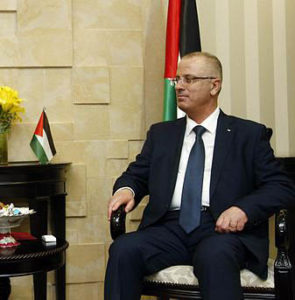Stop American Aid to the Palestinians Until the Terror Ceases

By Dragan Tatic; Bundesministerium für Europa, Integration und Äusseres – Arbeitsbesuch Ramallah, CC BY 2.0, https://commons.wikimedia.org/w/index.php?curid=32427973
In the twilight hours of the Obama administration, Secretary of State John Kerry authorized the transfer of $221 million to the Palestinian Authority—in violation of an informal agreement with Congress not to do so. Fortunately, President Trump stopped the transfer before the money left America’s shores. Now he has the opportunity—and the responsibility—to do more.
Lawmakers had good reason to oppose the transfer. Much like with the $400 million cash ransom paid to Iran last year, no meaningful effort was made to account for how the money was to be spent or to prevent it from being used to kill innocents.
Since 9/11, it has been accepted wisdom that stopping funds flowing to terrorism is a vital way to diminish its reach and incidence. In the fight against Islamic State, much of the success—albeit too little and too late—can be traced to efforts to target some of its principal sources of money: oil, trafficking in antiquities, and regional money exchangers that provide the commerce necessary for the killing.
A second operating principle growing out of 9/11 is that people who underwrite terrorism bear culpability equal to those who commit it. Much of the antiterrorism framework established in the Bush administration focused on imposing responsibilities on the international financial community to identify and prevent the transfer of terrorist funds. It is a difficult task because money intended to kill bears few DNA markers, whether transferred by ancient means (gold) or modern ones (digital). Notwithstanding those challenges, financial institutions that have turned a blind eye have faced punishing billion-dollar consequences.
Not so, however, the U.S. government. Over the past 10 years, Washington has provided more than $4 billion in foreign aid to the Palestinian Authority. The goal has been to promote a government in the Palestinian territories capable of assuming the responsibilities of a sovereign state, including the recognition of the state of Israel as a legitimate member of the community of nations. The aid has focused principally on security and criminal-justice programs, U.S. Agency for International Development sponsored assistance for schools, health clinics, water and economic development, and generalized support for the Palestinian Authority’s budget. But unlike the many nongovernmental organizations that contribute charitable funds to the region, American assistance programs, while obliged to vet how the money is spent, have yet to ensure effectively that taxpayer dollars are not diverted to support acts of terror.
Yet there is no question that this is happening. First, the State Department has acknowledged the diversion in reports to Congress, as documented most recently in a Dec. 16, 2016, Congressional Research Service report. As a remedy, Washington simply reduced its aggregate aid by an amount that is classified but is reported to be pegged to intelligence estimates of what the Palestinian Authority spends to sponsor acts of terrorism. But money is fungible, and it is sophistry to argue that funds provided for good deeds do not enable the bad deeds of the same political entity, particularly given the scarcity of resources.
Second, the Palestinian Authority’s support for killing—such as the stabbing rampage that took the life of Taylor Force, a West Point graduate, in Jaffa, Israel, last March—is indisputable because it is codified in law. Statutes pledge to “martyr” families triple the income for life of the average salary in the West Bank, free tuition, health insurance and clothing allowances. So popular is the program of pensions for the maiming and killing of civilians that, according to its own 2016 budget, the Palestinian Authority dedicates more than 500 full-time civil servants to its administration, at a cost of around $315 million, or roughly 8% of the budget of the would-be Palestinian state.
In the face of this widely advertised bureaucracy of terror, the Trump administration should suspend all further aid to the Palestinian Authority. Not another dollar should flow until measures are adopted to assure that no more people are slain because American aid enabled the Palestinian Authority to confidently promise compensation for killing. Congress has already introduced the vehicle to do this, a bill in the name of Taylor Force. If passed into law, it would condition aid on the secretary of state’s certification that the Palestinian Authority has ended its legal sanction of terrorist financing. Without such a commitment, and strong due diligence by the State Department to ensure that it is honored, American funding of the Palestinian Authority should cease.
That such a straightforward proposition has escaped the Washington establishment for over a decade is perhaps one reason the country has a new president. Mr. Trump should at last enforce the 9/11 orthodoxy that if you stop the money, you stop the killing.
Mr. Aufhauser was chairman of the National Security Council Policy Committee on Terrorist Financing and the general counsel of the Treasury Department after 9/11. Mr. Gerber is a fellow at the Jerusalem Center of Public Affairs.
Originally published in The Wall Street Journal